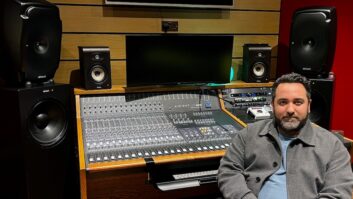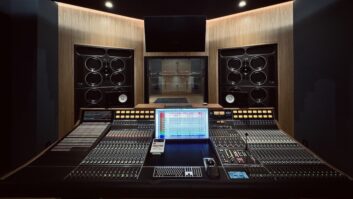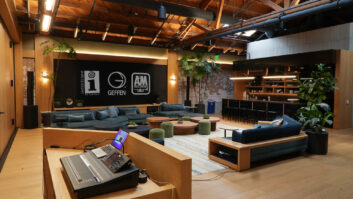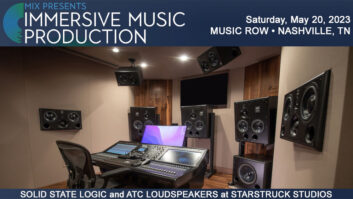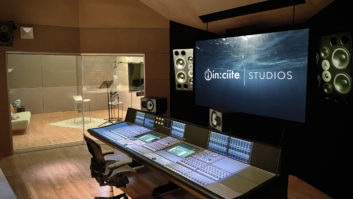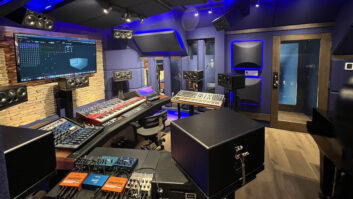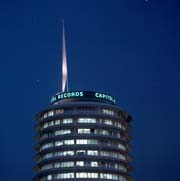
Hollywood’s pro audio and music communities are in an uproar. As reported in recent stories in the Los Angeles Times and other media outlets, the widely acclaimed acoustics of Capitol Records’ historic recording facilities in Hollywood face a very serious threat from the proposed construction next door of a 16-story condominium complex and underground parking garage that would accommodate 242 cars.
The Los Angeles Planning Commission officially approved this development project. The L.A. Times reported on June 18 that Capitol’s parent company, EMI, appealed to the City Council to overturn the approval. On June 24, the L.A. City Council’s Planning and Land Use Management (PLUM) Committee considered this issue in a public meeting, hearing testimony from speakers representing both sides of the issue, including Maureen Droney, executive director of the Recording Academy’s Producers & Engineers Wing, who expressed NARAS’ opinion that the development should be modified to protect the studios’ ongoing operation. The PLUM Committee then voted “in favor of strict noise controls,” as reported by the Times‘ Bob Pool, as part of its recommendation to the full City Council to grant permits for the construction.
Multiple Grammy Award-winning producer/engineer Al Schmitt and numerous other independent musicians, composers, engineers and producers have publicly voiced their concerns over the potential effects of the project’s nearby construction on Capitol’s studio operations. In particular, they’re concerned about the impact of the parking garage’s excavation on the integrity and quality of Capitol’s eight unique subterranean echo chambers that were specially designed by Les Paul in 1956.
“The impact is going to be basically on the echo chambers, and it’s devastating to me,” says Schmitt, who works at Capitol throughout the year. “I use the live chambers all the time on all the records I do-Diana Krall, or Natalie Cole, or Chris Botti. The live echo chambers are so essential to the sound we get. It’s just a magical thing that happens. So, we’re going to have to try to come up with some more magic somewhere, and I’m not sure how we’re going to be able to do it.”
Dan Foliart, president of the nonprofit organization The Society of Composers & Lyricists, testified to the PLUM Committee that “the historic echo chambers…are the lifeblood of the L.A. sound. Although it may be difficult to imagine how tunnels buried beneath a building can be so extraordinary, all you need to do is ask any of hundreds of talented recording engineers who utilize these tools on a daily basis as to their function in creating the wonderful sounds that emanate from these studios. To compromise the creative components that add to the richness of the overall product would be ill-advised.”
Independent Los Angeles-based recording engineer Les Brockmann also expressed these concerns to the Committee. “The studios at Capitol are important not just for historical reasons, but are a thriving contemporary place to record the best music,” Brockmann says. “I work there on score music for film and television, sometimes mixed ‘live’, with orchestras and bands [comprised] of L.A.’s finest musicians. These projects are always very tightly budgeted and scheduled. I am concerned that construction noise could interrupt these sessions. I told the committee [that] I can just see the potential of having to stop a session, and have a roomful of people sit and wait while someone made a call to request that construction machinery be stopped. If this sort of thing becomes likely, our clients may have no choice but to look for another studio to book.”
Schmitt agrees that the construction noise could potentially impact Capitol’s business. “I know guys that have had studios that they built a subway under, and every time the train went by you’d have to stop doing whatever you were doing-and people stopped going to those places. I think the ideal situation would be maybe if [construction crews] worked from like 1 or 2 o’clock in the morning until 6 or 7, or maybe 8-usually [sessions] don’t start before 8. That would be one solution. But I don’t think they’ll do that.”
Brockmann adds that the developer has “proposed various mitigations to try and minimize noise and interruptions, and I hope they are successful. We love working at Capitol and hope nothing happens to ever diminish the quality of that studio.”
The full City Council is scheduled to meet at Los Angeles City Hall on Tuesday, July 8, at 10 a.m. to discuss approval of the project’s permits.
Heritage Hollywood established an online petition for concerned members of the music community asking Los Angeles City Councilman (District 13) Eric Garcetti and the Los Angeles Planning Commission to halt the condo project.
For more information about this story, read the June 18 and June 25 articles from the Los Angeles Times, and watch the video segment “Capitol Records: Losing Sound and Losing Ground.”
Matt Gallagher is an assistant editor at Mix.

